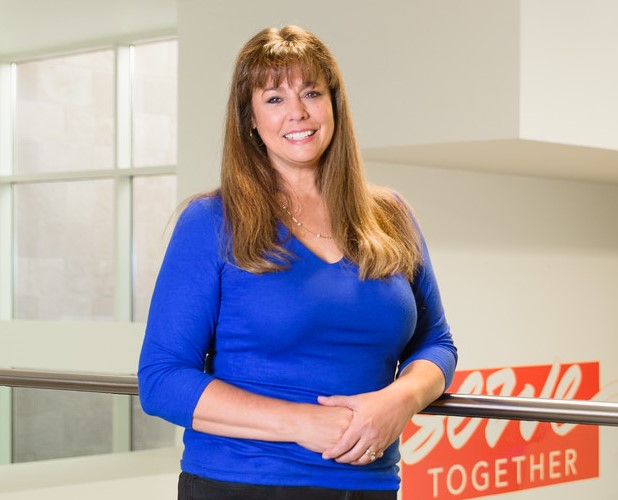
 With preparation, persistence and wise collaboration, Bridgeway is saving $450,000+ in yearly interest — even amid a pandemic
With preparation, persistence and wise collaboration, Bridgeway is saving $450,000+ in yearly interest — even amid a pandemic
By RaeAnn Slaybaugh
Heidi Coughran has spent most of her career in church operations. She says it’s “exactly my wheelhouse.”
So, when the opportunity arose in 2015 to join the staff at her beloved home church — Bridgeway — she was particularly thrilled.
“I was led here because of the authentic and dynamic preaching,” she recalls. “Pastor Lance [Hahn] is a great leader. I just felt super blessed to be amongst such a great group of people.”
But it wasn’t just Coughran’s passion for the church that made her a great fit; she also brought valuable business acumen to her position as director of operations, having spent time in secular human resources, construction development, and administration.
As part of the senior leadership team, this background has helped to drive nearly a half-million dollars per year in interest savings. But equally important was the expertise of a finance advisory team, plus the selection of a truly full-service banking partner.
The path to significant savings at Bridgeway Christian Church began with a commitment by Coughran and the finance advisory team to reviewing the church’s financial data every month. Comprised of volunteer financial experts and the church controller, this group pays particular attention to the church’s cost of financing versus market rates.
In doing so, they realized rates had declined significantly in February 2020.
“While we’re always monitoring these kinds of things, there’s a time and a place to act on them,” Coughran says. “At that point, we knew we could do better.”
A 300-plus-page RFP was assembled and sent to several financial institutions. A comprehensive package, it included everything from financial statements to attendance records.
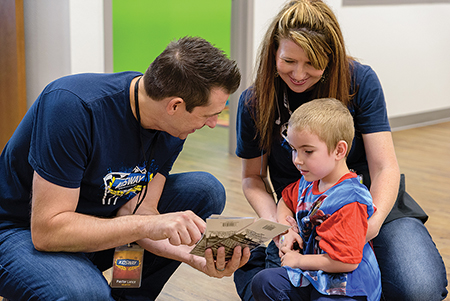
Bridgeway had narrowed its options to three banks when a trusted partner — Christopher M. Gordon, partner at Capin Crouse — suggested they reach out to a new prospect: David Lee, Director of Religious Institution Banking at Bank of the West.
“We have a great relationship with Chris, and he has a good understanding of what’s important to Bridgeway,” Coughran explains. “But relationships are also really important to us. Chris knew David personally, and he highly recommended him.”
Still in the decision phase, Coughran overnighted an RFP to the bank. The next day — a Friday — it responded with a preliminary request to move forward. By Monday, she had a terms sheet in hand.
“The response time was really impressive,” she says. “Turnaround was way quicker than we’d gotten from anybody else.”
The speed of response was especially laudable given the fact that COVID-19 kicked into high gear that week, spurring lockdowns nationwide. Despite this, Lee flew out personally to represent the bank’s offer and its options at the finance advisory committee’s monthly meeting.
“He hopped on a plane right before everything shut down, because he felt it was important to meet in person,” Coughran recalls. “I think he barely made it back before they began shutting down all the flights.”
At that point, Bridgeway had narrowed its choices to just two other banks. “And those outfits made no such efforts,” she points out.
The choice was clear — but not just because Lee and Bank of the West tried the hardest. Other factors were at play, too.
More than just numbers
Of course, Bridgeway prioritized securing the best possible terms, as any church might. Amazingly, Bank of the West’s solution saves the church more than $450,000 in annual interest as a result of refinancing its debt. Not only does this relieve daily financial pressure, but it affords Bridgeway the ability to reach out into its community and serve those who are really struggling right now.
While it’s an exceptional outcome, Bridgeway was also looking for a full-service banking partner, not just a lender.
Here again, Coughran says Lee and Bank of the West checked all the boxes.
 “They stood out because they clearly had the industry expertise we were looking for,” she explains. “When David made his in-person presentation to our team, we could see that he was really passionate about serving churches, and he clearly understood that we operate differently [than businesses].
“They stood out because they clearly had the industry expertise we were looking for,” she explains. “When David made his in-person presentation to our team, we could see that he was really passionate about serving churches, and he clearly understood that we operate differently [than businesses].
“It was almost as if we were cross-interviewing each other, to understand the priorities prior to entering into this relationship,” she adds. “That was really refreshing for all of us in the room.”
Though she and her team “pummeled” Lee with complex questions, Coughran says he did not appear to be phased.
“He presented financing options that we felt could serve our church well,” she says. “And the excellent service we received from David continued on from the rest of his team that we worked with throughout the refinance process. Basically, we knew our jobs would run much smoother as we used their banking solutions.”
An “in-the-trenches” perspective pays off
Having this confidence was key to Coughran and her team, because she had been on the other side of the equation before. Like so many churches, some of Bridgeway’s previous banking partners were unfamiliar with how nonprofits operate, financially. Not only is this frustrating, but it poses a multitude of risks for the church.
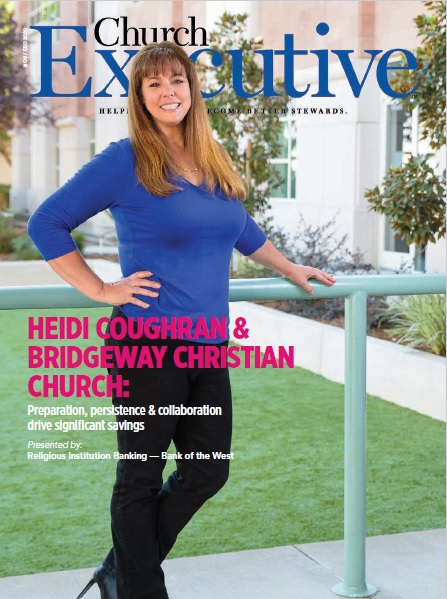
“If a church fails to maintain its financial records according to the state and federal laws that govern nonprofits, it can jeopardize its tax-exempt status,” she points out. “In some cases, it can also lead to a legal liability for either the board members or staff.”
With so much on the line, knowing that a church’s banking partner understands major accounting differences between for-profit and non-profit outfits can help avoid unwelcome surprises and ensure it meets its financial accountability and transparency requirements.
For Bridgeway, the confidence that Bank of the West understands these reporting differences in the financials has made for a much smoother refinancing process.
For Lee’s part, he says the bank’s intimate knowledge of church financial operations is well-earned, having funded more than $4 billion for churches of all sizes, across the country, for 25 years.
“Many of our team members have served on staff as senior, executive and education pastors, as well as on boards of churches and non-profit organizations,” he adds. “So, to say that we truly do understand is an understatement.”
He agrees that a lender’s lack of familiarity in this area is high-risk for the church client.
“It might result in unnecessary covenants — such as minimum quarterly or annual debt coverage ratios or liquidity ratios imbedded into the loan agreements — which could result in potential violation of covenants.”
Understanding creditworthiness — from the bank’s point of view
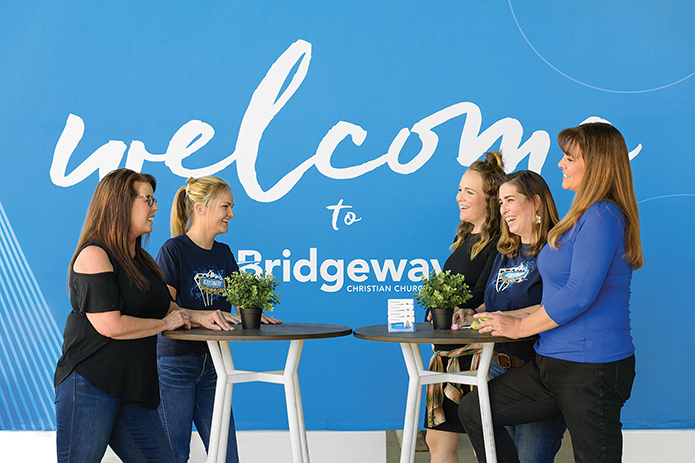
Of course, any good relationship is a two-way street. To this end, Lee credits the church’s thoroughness and transparency with helping to secure the best possible rates, quickly, even amid a fast-growing pandemic.
The substantial monthly savings we’ve realized have minimized our overhead and enabled us to do more within the community. Plus, the full-service partnership increases our organizational effectiveness in making ministry investment choices, because we now have more to work with.”
— Heidi Coughran
“We were thoroughly impressed with Heidi and the team at Bridgeway and their responsiveness to all questions and request for documentation,” Lee says. “It was evident that they’d been preparing for the refinance for quite some time.” The initial package, or RFP, had nearly every document needed, which minimized the “back and forth.” Additionally, the church was quick to provide comprehensive responses and data to support the impact COVID has had on its ministry, which was essential for the bank to understand.
Beyond this, Lee says Coughran and her team’s practice of regularly monitoring current market rates against their own lending terms is admirable.
“Unfortunately, some church leaders don’t monitor these rates until their loan is near maturity because they might feel obligated to stay through the full term of the loan,” he cautions. “As loan structure / terms can vary from one lender to another — which can impact the rate — I’d encourage churches to simply call an experienced church lender and ask. They should be able to help calculate the potential savings / payback period with a single phone call or Zoom call.”
Navigating COVID (and beyond)
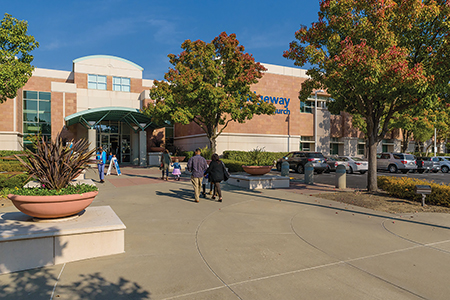 Right now, the coronavirus is playing a part in every aspect of church operations — including church lending. Bridgeway and Bank of the West know this better than most. So, what insights and advice can they offer to other churches?
Right now, the coronavirus is playing a part in every aspect of church operations — including church lending. Bridgeway and Bank of the West know this better than most. So, what insights and advice can they offer to other churches?
While Coughran admits “there’s no manual” for traversing these unprecedented times, the importance of adapting and effectiveness has certainly been amplified. At Bridgeway, this can be seen in the church body coming together in support, bringing ideas, networking, and organizing. According to Coughran, staff are learning to improvise daily to make operations more effective.
“But equally important is the relationship we’ve built with Bank of the West,” she adds. “The substantial monthly savings we’ve realized have minimized our overhead and enabled us to do more within the community. Plus, the full-service collaboration increases our organizational effectiveness in making ministry investment choices, because we now have more to work with.”
For other churches considering their financial options during the pandemic, Lee asserts that — as in ordinary times — it all starts with a conversation.
If a church is struggling and looking to refinance debt to save interest expense because it’s unable to meet its current obligations, then, he says, refinancing isn’t the solution. However, with a lending partner’s help, churches can take steps today to strengthen their financial position to eventually look like a healthy borrower.
QUICK FACTS ABOUT
BRIDGEWAY CHRISTIAN CHURCH
Year established: 1996
Location: Roseville, CA
Number of staff: 32 full-time / 24 part-time
Combined weekly attendance: 3,500 in-person / 1,400 online
2019 budget: $7.1 million
On the other hand, he adds, many churches across the country are growing in the midst of COVID and are stronger financially today than before. “Those churches might be leaving significant savings on the table that could otherwise be reinvested back into Kingdom work,” Lee cautions.
When the daily challenges of COVID subside, ideally a church will also have a trusted banking partner at its side to navigate what’s next. For Bridgeway, prayerful consideration will determine the best use of the funds beyond the pandemic, be it ministry growth, leadership development, saving funds towards the future development plans for campus expansion, and so on. It might mean developing the church’s 23 acres of land. In any event, when the time comes, Coughran says she feels confident that the church’s banking collaboration will help pave the way — just as it helped do in recent months.
“Bridgeway’s mission statement is ‘equipping one another to bring the wholeness of Jesus to a broken world,’” she says. “And I can say confidently that Bank of the West has really done its part in equipping us to continue our mission to do just that during these difficult times.”



Great!!! PTL